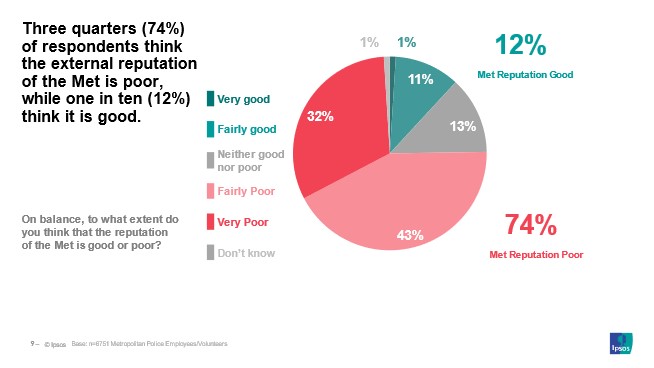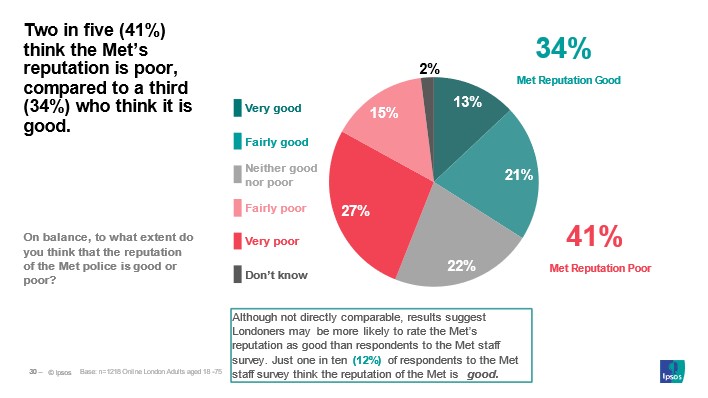Ipsos carries out data collection for the Baroness Casey Review of the Met Police
The Baroness Casey Review (the Review) into the Met Police was recently published and included several key findings from Ipsos data.
23 March 2023 / Crime, Justice, Police / Society / Race
THE AUTHOR(S)
Hannah Shrimpton Public Affairs
Haley Jones Public Affairs
The Baroness Casey Review (the Review) into the Met Police was recently published and included several key findings from Ipsos data. The Review into the standards of behaviour and internal culture of the Met Police, was commissioned in October 2021 following the sentencing of Wayne Couzens in the case of Sarah Everard. In November 2022, the Review commissioned Ipsos to carry out data collection activities to gather further evidence for the final report. These were:
- A staff survey of 6,751 current Met Police employees and volunteers through an open-source link. This was sent to all current Met Police employees and volunteers by email. The Met also encouraged participation in the survey through online forums. Due to the survey methodology, the survey reflects the perceptions of those who took part and is not necessarily representative of all Met Police employees and volunteers.
- A representative online survey of 1,218 Londoners aged 18-75 through the Ipsos’ Online Access Panel.
Key findings of the staff survey
- Nearly three quarters (74%) of Met Police employees who responded to the survey think the Met’s external reputation is poor, with only one in ten (12%) saying the Met’s reputation is good. Over four in five (85%) say the Met’s reputation has worsened in the last 12 months.

- Just over half (55%) of respondents with a public facing role say they feel safe when interacting with the public. However, of these, the majority say they have experienced verbal (93%) or physical (71%) abuse from a member of the public.
- Of those responding, a fifth (22%) of Met employees say they have personally experienced bullying at work.
- Around two in five Met employees responding to the survey say they have felt pressured or expected to do something at work in the Met that went against their better judgement (41%) or was contradictory to their own personal or professional values (37%). One in five respondents say they have felt pressured or expected to do something in contradiction to the Met’s own rules or guidance (22%) or to the Met’s values (20%).
- A third (33%) of female respondents to the survey report personally experiencing sexism at work and 12% report directly experiencing sexual harassment or assault.
- A third of ethnic minority respondents report personally experiencing racism and a fifth (19%) of the Lesbian, Gay, or Bisexual respondents surveyed say they have directly experienced homophobia.
Key Findings of the Londoner Poll
- Two in five Londoners (41%) think the Met’s reputation is poor, compared to a third (34%) who think it is good. This varies by demographics, with over half of LGBTQ+ Londoners (54%) and Black Londoners (53%) saying the Met’s reputation is poor (compared to 40% of non-LGBTQ+ Londoners and 40% of White Londoners). Whereas those on higher incomes (over £100k a year) (53%); men (42%); those living in inner London (42%) and from White ethnic groups (40%) are more likely to think the Met’s reputation is good.
- Londoners are most likely to cite poor behaviours and actions of individual officers in the Met (77%); high profile incidents and scandals (68%) as reasons for a decline in the Met’s reputation. Just over half think this is due to institutional bias within the Met (55%); failures of leadership and management structures within the Met (54%) and/or negative media coverage (53%).
- Over half (54%) of Londoners feel that they have never been asked for their views on what policing priorities should be in London, and fewer than one in ten (9%) say they have been asked within the last year.

- Only half (50%) of Londoners are confident in the Met’s ability to keep women and girls safe, and 35% say they are now less confident of this compared with 12 months ago.
- Only 30% of Londoners think the Met treats Black people fairly (only 14% of Black Londoners think this). Black Londoners are less confident than White Londoners that they would be treated fairly by the Met if they were reporting a crime (49% Black people vs 72% White people). They are far less confident than White Londoners that they would be treated fairly if they were suspected of committing a crime (26% Black people vs 63% White people).
- That 51% of LGBTQ+ Londoners do not have confidence in the Met to treat people fairly and equally, compared with 40% of heterosexual Londoners.
Technical note:
For the Londoner poll, interviews with Londoners aged 18-75 were conducted between 12and 23 December 2022 through the Ipsos’ Online Access Panel. Of those invited, 1,218 completed the survey.
Quotas were set to reflect the known profile of the London adult population by age, gender, work status and inner/outer London. Results have been weighted to account for any shortfall in quotas, including an interlocking weight by ethnicity and social grade, age and ethnicity and ethnicity and working status.
A boost sample was achieved in the following: LGBTQ+ Londoners (136 interviews achieved), Black African/Black Caribbean/Black British Londoners (172 interviews achieved) and Asian/Asian British Londoners (251 interviews achieved). For the overall results, results have been weighted back to the correct proportion for each sub-group in London.
For the staff survey Ipsos surveyed 6,751 current Met Police employees and volunteers online through an online open-source link.
Fieldwork Dates: Monday 5th December 2022 - Tuesday 3rd January 2023. During fieldwork, demographic quotas were monitored. However, because it was an online survey it was not possible to set or achieve exact quotas. Although the achieved sample closely resembled the known profile of Met Police employees and volunteers, the data was weighted to reflect the profile of the Met workforce. The data has been weighted by: length of tenure, current role and officer rank.
Due to the survey methodology, the survey reflects the perceptions of those who took part and is not necessarily representative of all Met Police employees and volunteers.
